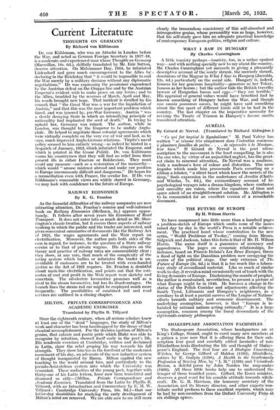AURELIA By Gerard de Nerval. (Translated by Richard Aldington .)
" Ce qui fat baptise le Symbolisme." M. Paul Wilily has written " se resume fres' simplement dans !'intention commune a plusieurs families de polies . . . . de reprendre a to Muslim., fur Nen.' If Gerard de Nerval is the poet whose ascription to the movement is the least compelling, he is also the one who, by virtue of an unjustified neglect, has the great- est claim to renewed attention, De Nerval was a madman, with a madman's love of colour. and distortion. The same impulse which made him promenade Paris escorting on a ribbon a lobster, " a silent beast which knew the secrets of the deep" finds expression in the undertones of Aurelia (Chatto and ,Windus, 7s. 6d.), the extraordinary account of his psychological voyages into a dream-kingdom, where confusion and unreality are rulers, where the equations of time and space admit of no straightforward solution. Mr. Aidington is to be commended for an excellent version of a remarkable document.


































 Previous page
Previous page